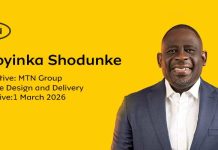President and CEO of MTN Group, Ralph Tendai Mupita has said that MTN will go big on smart partnerships in its bid to continue playing a pivotal role in Africa’s digital economy over the next 30 years and beyond.
He was speaking in an exclusive interview about the 30 years of MTN operations in Africa since the first call on the network on June 1, 1994, and what the next 30 years holds for the company.
Over the past 30 years, MTN has operated in some 21 markets across Africa and the Middle East. But it is now strictly present in 18 African countries where it is either number one or number two in terms of overall market share, and controls over 288 million customers in total.
Additionally, MTN has over the years gone very big on fintech, recording some 63 million users of its mobile money services, and a significant US$273 billion worth of transactions in 2023 alone.
So what does the next 30 years hold for the biggest telecoms company in Africa?
Ralph Mupital said “Smart partnerships is going to be the real deal for us going forward and that is what we are readying ourselves to do.”
He noted that in the digital economy being created in Africa, digital infrastructure has become more critical than the traditional infrastructure like roads, railways, ports and others.
This, he said, is because digital and wireless infrastructure connects and supports all the other critical institutions like banks, schools, hospitals, mining firms, shipping etc and drives growth and development in ways that other forms of infrastructure do not.
“Particularly in the global south, which is our economies, digital infrastructure has become like a tool of public good provided by the private sector because the transformation of economies largely depend on the wireless infrastructure provided by the private sector,” he said.
Ralph Mupita also stated that the next frontier of growth in the digital economy journey is enterprise solutions, which means 5G is going to be very critical, adding that going forward “always staying connected” no matter one’s location will become the order of the day, and that is where 6G and a combination of other technologies like satellite will also be critical.
According to him, all of these developments will requires huge capital investment and that is why it is part of MTN’s future strategy to have smart partnerships to leverage on resources and expertise of others for the common good of the continent.
“Part of the future of MTN is that we are not going to do everything alone. A lot of capital will be required and that is why smart partnerships will be critical,” he said.
Ralph Mupita also noted that fintech will be another area where smart partnerships will be critical because MTN’s fintech strategy is to drive financial inclusion and not to compete with traditional commercial banks.
He said the focus is to draw the unbanked and small spenders into the financial sector through the use of its wide and formidable distribution networks and technologies, since there is no real business case for traditional banks to spend money on physical branches just to reach the small spenders.
Again, the MTN Group CEO noted that it is embarking on smart partnerships with industry giants like Mastercard to reach more people with digital financial services, and also with Sanlam to reach more people with microinsurance services.
Ralph Mupita noted how mobile telecoms has transformed the global south since the early 1990s, from the days of fixed line services when tele-density in most African countries was less than one to telephone to a 100 persons, to now that some countries in Africa are recording over 100% penetration levels due mobile telephony.
He said MTN has been a key leader in that mobile telephony revolution and will continue to champion the journey towards the transformation of the continent on the bank of digitalization.
MTN is the largest taxpayer and one of the biggest employers in most of the markets it operates in now. In Ghana, for instance, MTN is a significant market power, commanding almost 80% of the total market, and it is indeed the overall biggest taxpayer in Ghana and one of the biggest employers.
Watch the video below for the full 14.07 minute interview.












[…] CEO, Ralph Mupita, has in recent interview also hinted that in the next 5 years, MTN will pursuing smart partnership strategies to ensure that they leverage on the strengths of others to deliver on the aspirations of customers […]